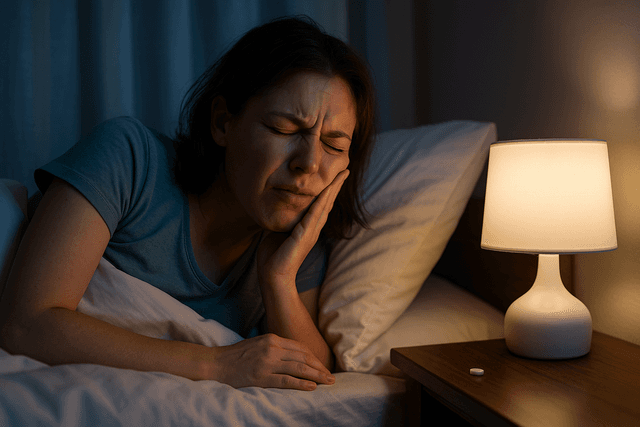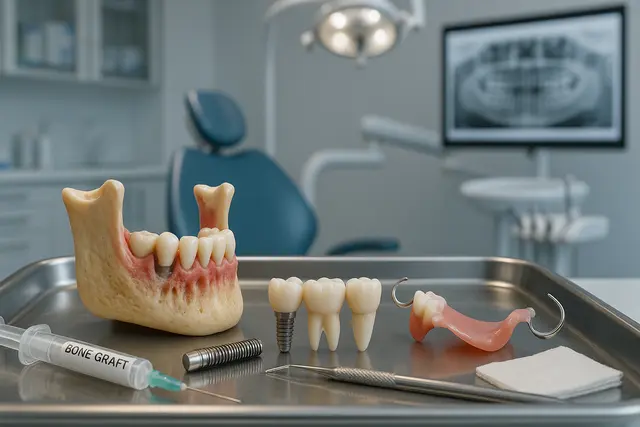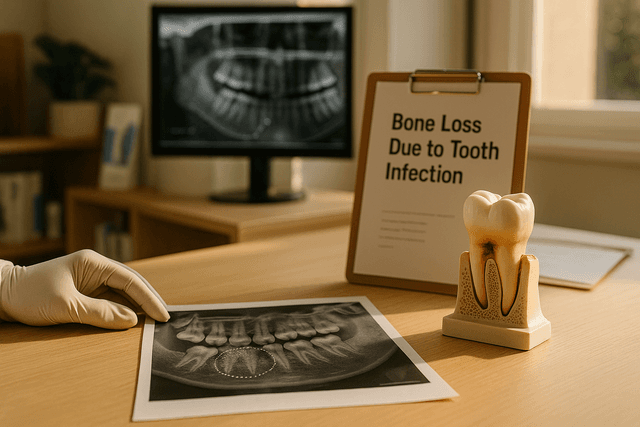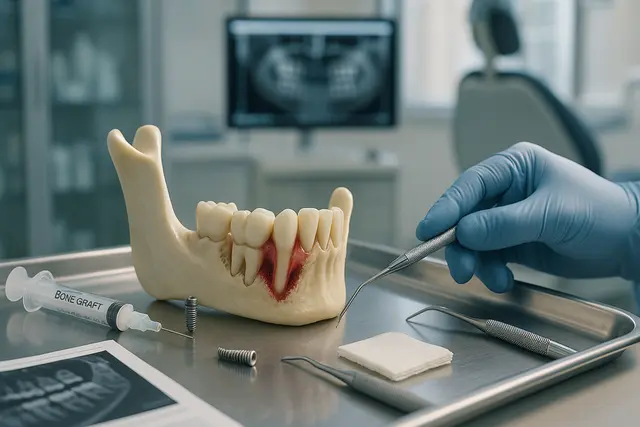Oral Health
6 min read
Jun 25, 2025
Waking Up with Tooth Pain at Night? Here’s What to Do
Waking up with a toothache in the middle of the night isn’t just frustrating, it’s downright painful. When your tooth hurts at night, it can feel sharper, throb harder, and completely wreck your sleep. But you don’t have to suffer in silence (or in the dark).

There’s nothing quite like being yanked out of a deep sleep by a sudden, throbbing toothache. One moment you’re dreaming of sunshine and beach chairs, the next you’re clutching your jaw in the dark, wondering why your tooth decided this was the perfect time to rebel. If you’re dealing with tooth pain at night, you’re not alone, and you’re definitely not imagining it. Toothaches really do feel worse at night, and there are some surprisingly logical reasons why.
Let’s talk about what’s going on inside your mouth when your tooth hurts at night, what might be causing it, and more importantly, how to get rid of a toothache without losing your mind or your sleep.
Toothache Waking You Up? Why Toothaches Feel Worse at Night
First off, let’s confirm what you already suspect: yes, toothaches do tend to get worse at night. During the day, you’re distracted, working, chatting, bingeing a show, arguing with your dog over who owns the couch. But when the lights go out and your mind quiets down, every little throb feels amplified. That aching tooth suddenly becomes the star of the show.
There’s also gravity at play. When you lie down, more blood flows to your head, increasing pressure around a tooth that’s already irritated. That can cause pain to intensify, especially around a broken tooth, cavity, or inflamed gum.
On top of that, when you’re trying to sleep, you don’t have your usual pain distractions like coffee or noise or even food. Pain and sleep are not friends. And once your brain locks onto the pain, it’s hard to tune it out. Which leads us to the next logical question: what exactly is causing all this misery?
Common Causes of Toothaches That Get Worse at Night
Here’s where things get a bit scientific, but stick with us. Toothaches are your body’s way of saying, “Hey! Something’s wrong in here!” There are a few common culprits behind nighttime tooth pain.
Tooth Decay or Cavities: The classic offenders. Tooth decay eats away at the protective enamel until it hits the sensitive parts of the tooth, the dentin and, eventually, the dental pulp, where the nerves and blood vessels live. That’s when pain starts to throb.
Gum Disease: When gums are inflamed or infected, the pain can radiate around a tooth. Swollen gums can also press against sensitive areas at night, especially if your head is flat on the pillow.
Dental Abscess: This one’s serious. A dental abscess is a pus-filled infection deep inside the tooth or gum. It often causes severe tooth pain, swelling, and sometimes fever. If your toothache is intense and persistent, don’t wait, this is a dental emergency.
Teeth Grinding (Bruxism): Some people grind their teeth without even knowing it. At night, this can cause tooth pain, sore gums, and even cracks or damage. If you wake up with sore teeth or jaws, this might be the cause.
Wisdom Teeth or Impacted Teeth: As they shift or push against neighboring teeth, wisdom teeth can cause pain at night. They may not fully break through the gum, which adds pressure and discomfort.
Sensitive Teeth: If your teeth react to cold air, sweet food, or even brushing, the enamel might be worn down. That leaves the inner nerves exposed, making your teeth more reactive, and nighttime air isn’t exactly warm.
Can a Remedy Actually Help Ease the Pain at Night?
Yes. While there’s no magic wand for treating a toothache in the middle of the night, a few home remedies and small changes may help ease the pain enough for you to get back to sleep.
Rinse With Warm Salt Water: This is a classic for a reason. A saltwater rinse can reduce inflammation, clean the area around a tooth, and offer some mild relief. It’s easy, fast, and effective, just don’t swallow it.
Apply a Cold Compress or Ice Pack: Applying a cold compress to the outside of your cheek near the painful tooth may help reduce swelling and numb the area temporarily.
Use Clove Oil: This isn’t just your grandma’s go-to trick. Clove oil has natural numbing properties and may relieve the pain from a toothache for a short while. Dab it gently on the area with a cotton swab.
Try an Over-the-Counter Pain Reliever: If the pain is moderate, taking a pain reliever like ibuprofen or acetaminophen may help ease the throb. Just be sure to follow dosage instructions and don’t rely on them as a long-term fix.
Keep Your Head Elevated: Lying completely flat can increase blood pressure in the head, making a toothache worse. Propping your head up with an extra pillow might reduce the pain just enough to catch some sleep.
These home remedies can help reduce discomfort temporarily, but they won’t fix the cause. If your tooth pain persists, it’s time to get serious.
When to Seek Professional Dental Help
There’s pain, and then there’s pain. If your toothache is causing constant discomfort, swelling, fever, or it’s hard to eat or sleep, don’t wait it out. You may be dealing with a dental abscess, broken tooth, or infection that requires immediate attention.
Even if the pain subsides during the day, don’t assume the problem has magically vanished. A dental issue that causes pain at night is likely to get worse without treatment.
Seeking professional dental care sooner rather than later may save you from a root canal or tooth extraction. Plus, a good dentist can pinpoint what’s really going on, whether it’s a tiny cavity, gum disease, or something pressing deep inside the tooth.
Don’t tough it out alone. You deserve sleep, comfort, and a healthy mouth.
The Role of Dental Care in Preventing Nighttime Tooth Pain
Let’s get honest: most toothaches can be prevented with solid dental care. That means brushing twice a day, flossing like you mean it (not just the week before your dental visit), and visiting your dental team every six months.
Regular checkups allow your dentist to catch small issues before they become sleepless-night-level problems. A minor cavity today could turn into a painful tooth tomorrow.
If you grind your teeth, your dentist can help with a night guard. If you’ve got sensitive teeth, they may recommend a specific toothpaste. Whatever your dental needs are, consistent care helps keep your teeth and gums in their best shape.
Remember: your mouth isn’t trying to sabotage your sleep. It’s just asking for a little TLC.
What to Do If Your Tooth Hurts at Night and You Can’t See a Dentist Immediately
Okay, it’s 2 a.m. and your tooth hurts like heck. Maybe you’re traveling. Maybe your dental office isn’t open until Monday. Here’s what you can do while waiting for professional dental help:
Avoid very hot or cold foods
Don’t chew on the side of your mouth where the pain is
Rinse with salt water
Apply clove oil or a cold compress
Use over-the-counter pain medication if needed
Keep your head elevated
Try to distract yourself with calming activities, like music or gentle breathing
These steps won’t cure the problem, but they may relieve the pain enough to help you make it to morning.
Dealing with a Toothache? Don’t Wait Until It Gets Worse at Night Again
Toothaches don’t just show up for fun, they’re signs that something needs fixing. The longer you wait, the more likely that minor discomfort turns into a full-blown dental emergency. Whether it’s a throbbing ache, pain from a toothache that keeps returning, or nighttime tooth pain that won’t quit, getting professional dental care is the best remedy.
So if your tooth is causing drama while you’re trying to sleep, take it seriously. Trust your instincts, seek out the help you need, and remember: a good night’s sleep shouldn’t be interrupted by a rebellious molar. Let your dental team help relieve the pain, and bring back those peaceful, pain-free nights.
Why Does My Tooth Hurt More at Night Than During the Day?
Tooth pain often intensifies at night because lying down increases blood flow to your head, which can raise pressure around an inflamed or infected tooth. Plus, without daytime distractions, your brain focuses more on the pain, making it feel worse.
What Can I Do to Relieve Toothache Pain Overnight?
To ease nighttime tooth pain, try rinsing with warm salt water, applying a cold compress, using clove oil, or taking over-the-counter pain relievers like ibuprofen. Keep your head elevated with pillows to reduce pressure. These steps may help you sleep until you can see a dentist.
What Causes Toothaches That Get Worse at Night?
Nighttime toothaches are commonly caused by tooth decay, dental abscesses, gum disease, or teeth grinding. Wisdom teeth and tooth sensitivity can also be culprits. These conditions can worsen when lying down, leading to increased pain and discomfort after dark.
When Should I See a Dentist for a Nighttime Toothache?
If your toothache is persistent, severe, or accompanied by swelling, fever, or difficulty eating or sleeping, don’t wait, see a dentist as soon as possible. These symptoms may indicate an infection or damage that requires immediate treatment to prevent complications.
Read Next
Related Posts

Oral Health
Tooth Replacement Options to Prevent Bone Loss
Losing a tooth isn’t just about appearance, it can have a lasting impact on your oral health, jawbone strength, and overall quality of life. When teeth go missing, the jawbone begins to shrink, which can change your bite, your facial structure, and even your confidence. Fortunately, modern dentistry offers several effective solutions to replace missing teeth and prevent further bone loss.
4 min read
Sep 26, 2025

Oral Health
Bone Loss Due to Tooth Infection Explained: What It Means for Your Oral Health
A tooth infection isn’t just about pain, it can quietly damage the tissues around a tooth and even erode the jawbone that supports your smile. This guide explains how infections start, why they can lead to bone loss, the warning signs to watch for, and the treatments that can stop the spread and rebuild lost support.
5 min read
Sep 25, 2025

Oral Health
Understanding Bone Loss in Teeth: Causes and Treatments That Work
Bone loss in teeth is a silent threat that can compromise your smile, facial structure, and overall oral health. While it often goes unnoticed in the early stages, it can lead to serious consequences if left untreated. Understanding what causes dental bone loss, and how to prevent or manage it, is key to maintaining a strong, healthy foundation for your teeth.
5 min read
Sep 25, 2025
Don’t have time to research every dentist around you?
See why 30k+ patients trusted us